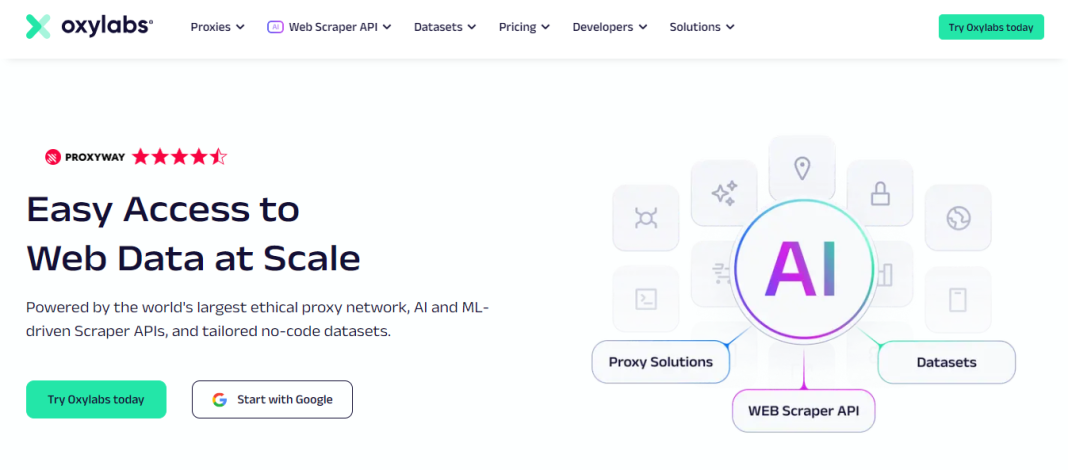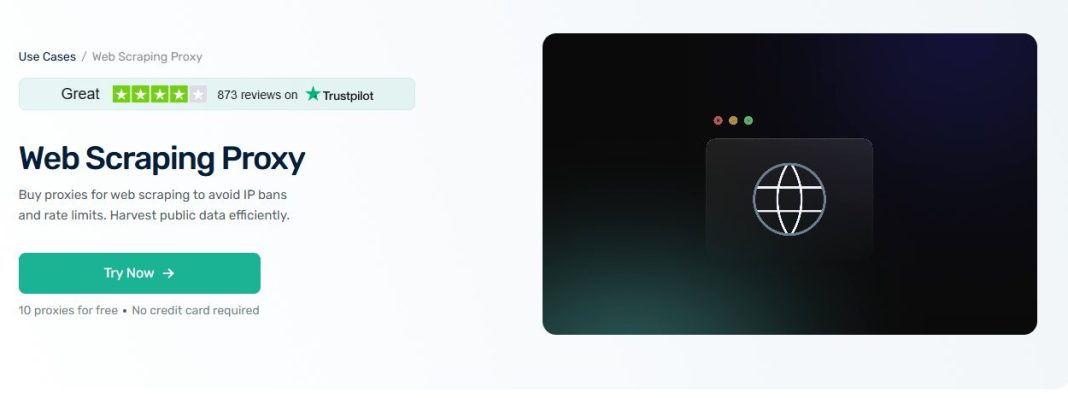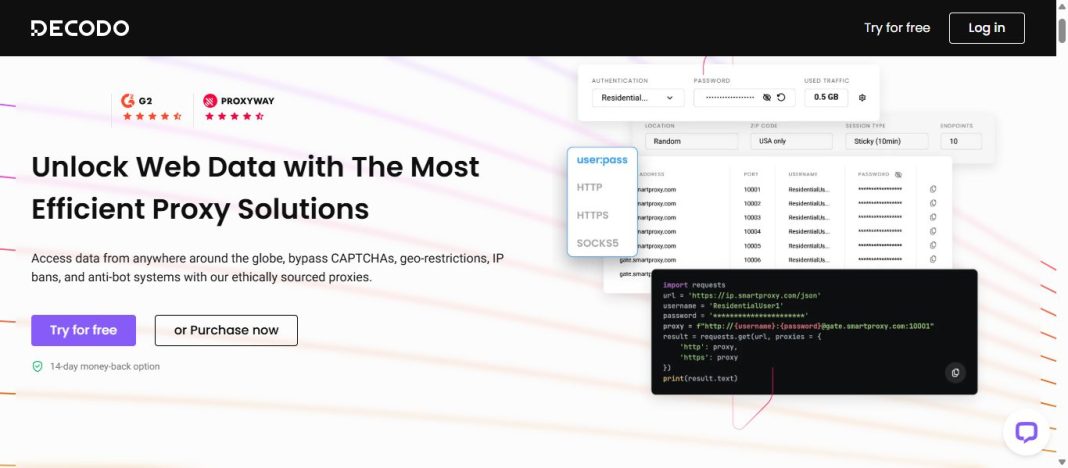In this post, I will show you the best proxies for GPT-3.
Due to the propagation of generative AI, tools like OpenAI’s GPT-3 have revolutionized the way developers, businesses, and researchers engage with language processing tasks. From creating chatbots to summarizing content and generating human-like responses, GPT-3 opens up a world of possibilities.
However, to unleash the full power of GPT-3—whether for API scraping, managing distributed requests, or powering intensive AI workflows—you need a reliable proxy service. Proxies act as a mediator between your system and GPT-3 servers, helping you scale, rotate IPs, and bypass geographical or rate limitations.
This article reviews the best proxies for GPT-3, featuring premium and developer-friendly proxy services.
Table of Contents
Why Use Proxies with GPT-3?
Before diving into the top providers, here’s why using proxies with GPT-3 is important:
- Rate Limiting Avoidance: Distribute requests to prevent throttling.
- Geo-Specific Testing: Run GPT-3 prompts from different regions.
- Load Distribution: Scale and manage high-volume requests without being blocked.
- Privacy & Security: Maintain anonymity and secure communication pipelines.
- API Scraping & Monitoring: Monitor GPT-3-driven platforms and outputs at scale.
Best Proxies for GPT-3 – EDITOR’S CHOICE
🥇 1. Oxylabs – Enterprise-Grade Proxies with AI-Ready Infrastructure
Oxylabs is a titan in the proxy industry, and it leads when it comes to large-scale, reliable solutions for enterprise AI projects. If you’re working with GPT-3 at a commercial level—training datasets, automating feedback loops, or integrating advanced AI tools—Oxylabs’ infrastructure is unmatched.
Key Features:
- 175M+ residential IPs and datacenter IPs
- Dedicated AI proxy pools for language model integration
- Precise geo-targeting across 190+ locations
- High success rate and minimal latency
- Intuitive dashboard with API control
Why It’s Great for GPT-3:
- Allows developers to send high volumes of requests
- Clean, ethical proxy sourcing—ideal for sensitive AI projects
- Excellent support for ML engineers and data scientists
Verdict: Oxylabs is perfect for businesses running GPT-3 integrations at scale or operating research-grade AI pipelines.
🥈 2. Webshare – Developer-Centric and Affordable Proxy Solutions
Webshare has gained a solid reputation among developers and startups for offering affordable, reliable proxies without sacrificing quality. It’s perfect for GPT-3 users who want simplicity, performance, and affordability rolled into one.
Key Features:
- Free proxy tier for testing GPT-3 bots
- Static residential and datacenter proxies
- User-configurable settings for IP rotation
- No bandwidth limit for many plans
- Easy integration with OpenAI libraries and wrappers
Why It’s Great for GPT-3:
- Low-cost entry makes it ideal for indie developers
- Supports tools that scrape GPT-3 usage patterns or APIs
- Great control over proxy rotation policies
Verdict: Webshare is an ideal companion for developers running solo GPT-3 experiments or testing open-source AI models before scaling.
🥉 3. Decodo (formerly Smartproxy) – Flexible Proxy Services for AI Developers
Decodo is the rebranded identity of Smartproxy, one of the top proxy providers globally known for flexibility, high-speed proxies, and fantastic developer support.
Key Features:
- 115M+ IPs in the residential network
- SOCKS5, HTTP, and HTTPS support
- Proxy rotation and session control options
- Easy integration with Python, Node.js, and scraping libraries
- Pay-as-you-go or monthly options
Why It’s Great for GPT-3:
- Proxies work seamlessly with GPT-3 testing environments
- High-speed infrastructure helps with real-time GPT-3 tasks
- Ability to scrape or access OpenAI endpoints intelligently
Verdict: Decodo is a reliable choice for developers who need flexible proxy packages without going full enterprise.
Other Best Proxies for GPT-3
1. IPRoyal – Budget-Friendly Yet Powerful
IPRoyal is an often-underestimated proxy provider offering highly competitive prices and decent performance, particularly suitable for GPT-3 scraping, prompt experimentation, or API-side testing.
Key Features:
- Rotating and static residential proxies
- 99.9% uptime with low-latency networks
- Dedicated proxies available for secure environments
- Simple dashboard for managing traffic and sessions
Why It’s Great for GPT-3:
- Works well for open-ended GPT-3 testing and prompt engineering
- You can scale requests affordably and avoid usage blocks
- Suitable for academic or bootstrapped projects
Verdict: If you’re looking for value for money and just need a functional GPT-3 scraping pipeline—IPRoyal delivers.
2. Bright Data (formerly Luminati) – The Most Advanced Infrastructure
Bright Data is best known for its sheer scale, compliance, and targeting options. It’s a beast of a proxy provider, and for GPT-3-related use cases in industries like finance, e-commerce, or publishing, it provides powerful custom tools.
Key Features:
- 72M+ IPs globally
- Dedicated AI support and proxy SDKs
- Country/city-level geo-targeting
- Intelligent retry mechanisms and session control
- Best-in-class compliance and monitoring tools
Why It’s Great for GPT-3:
- Ideal for creating robust AI data collection tools
- Facilitates compliance for high-risk environments
- Trusted by global enterprises
Verdict: Pricey, but indispensable for advanced AI and GPT-3 powered platforms.
3. SOAX – Clean Proxy Pools for Academic and AI Testing
SOAX is another impressive provider known for clean IP pools and reliability. It shines for research institutions, students, or solo AI hobbyists testing GPT-3 responses, chat interfaces, or dataset augmentation methods.
Key Features:
- Over 8.5 million IPs
- City-level targeting in 120+ countries
- Mobile and residential proxies
- Highly customizable IP rotation settings
Why It’s Great for GPT-3:
- Delivers stability during session-based prompt testing
- Supports load balancing and failsafe mechanisms
- Excellent for academic or research-grade GPT-3 use cases
Verdict: Great for labs, researchers, or developers working on the cutting edge of AI language modeling.
4. Proxy-Cheap – Cost-Efficient and Developer-Friendly
Despite its name, Proxy-Cheap offers more than just affordability. Their proxy infrastructure is excellent for light-to-medium GPT-3 workflows like scraping, testing, or fine-tuning prompts on a small scale.
Key Features:
- Shared and dedicated datacenter proxies
- Unlimited bandwidth plans
- Easy-to-use API and access control
- Custom dashboards and instant delivery
Why It’s Great for GPT-3:
- You can get started on a budget
- Suitable for prompt testing, scraping OpenAI APIs or GPT-based apps
- Helpful customer support for proxy configuration
Verdict: Perfect for GPT-3 enthusiasts who need reliability on a shoestring budget.
5. Rayobyte (formerly Blazing SEO) – High-Speed Datacenter Proxies for Intensive AI Workloads
Rayobyte is a well-respected name in the proxy space, especially for those seeking high-performance datacenter proxies.
Known for its blazing-fast speeds and reliability, Rayobyte is a favorite among developers who require real-time or low-latency access to GPT-3 endpoints. Their proxies come with unlimited bandwidth, which is especially useful for applications like model fine-tuning, data mining, and real-time prompt experimentation.
Rayobyte offers IPv4, rotating proxies, and custom IP whitelisting—features that enhance security and efficiency when dealing with GPT-3 tasks. Moreover, their datacenter proxies are among the most affordable in the U.S. market, making them a smart choice for developers who want high output at a reasonable price.
For teams handling consistent API calls to GPT-3—whether for product development, AI testing, or automated content solutions—Rayobyte gives you the infrastructure without the corporate red tape.
6. NetNut – ISP-Grade Proxies for AI Stability and Speed
NetNut provides ISP-powered static residential proxies—offering a hybrid between datacenter speed and residential authenticity. This makes them particularly valuable when GPT-3 use cases require high reliability and minimal downtime.
Unlike rotating residential proxies, NetNut’s ISP proxies maintain the same IP for extended periods, which is ideal for session-based GPT-3 prompt engineering or multi-step interactions.
Their infrastructure is directly connected to Tier 1 ISPs, offering some of the fastest and most stable connections available. This reduces the chance of interruptions, failed requests, or API timeouts—issues that could otherwise derail large GPT-3 data pipelines or AI chat systems.
NetNut is also developer-friendly, providing code samples and quick onboarding guides for integrating proxies into Python, Node.js, and even browser automation frameworks. If you need long-lasting sessions and robust stability, NetNut is a dependable option.
7. Storm Proxies – Simplified Proxy Solution for Small-Scale GPT-3 Projects
Storm Proxies is a proxy provider aimed at individuals or small businesses who need an easy-to-understand and plug-and-play solution.
While they do not offer a massive IP pool like Oxylabs or Decodo, they shine in usability and speed. Storm Proxies delivers dedicated proxies with unlimited bandwidth, which is valuable for GPT-3 projects that involve continuous requests such as web automation or chatbot stress testing.
Their proxies are U.S.-based, optimized for scraping, and particularly useful for simple GPT-3 prompts, content evaluation, and internal tooling. Pricing is straightforward and starts very low, making it accessible even to hobbyists or freelancers experimenting with AI workflows.
Though not ideal for geo-specific testing or high-level enterprise AI models, Storm Proxies fills the gap for budget-conscious GPT-3 developers who want reliability without the learning curve.
8. GeoSurf – Premium Residential Proxies with Exceptional Geographic Coverage
GeoSurf is a premium proxy provider that boasts a wide geographic reach, covering over 130 countries with precise city-level targeting. For GPT-3 users working on geo-specific content generation, localization testing, or regional prompt response comparison, GeoSurf offers an elite solution.
Their infrastructure is designed for enterprise-grade use, and while pricing may be on the higher end, the quality of service and security offered justifies the cost. GeoSurf proxies are particularly useful for developers building location-sensitive AI products, such as travel chatbots, legal advisory assistants, or localized marketing automation tools using GPT-3.
Furthermore, GeoSurf’s API access, session control features, and monitoring dashboards make it an excellent fit for advanced data teams who want detailed visibility into performance metrics. If your GPT-3 implementation relies heavily on regional diversity or content personalization, GeoSurf is a solid option.
9. Shifter (formerly Microleaves) – Massive Proxy Pool for Global GPT-3 Applications
Shifter offers one of the largest residential proxy pools globally, with millions of IPs from over 100 countries. This makes it a powerful tool for large-scale GPT-3 deployments where constant rotation and anonymity are critical.
Shifter’s rotating backconnect proxies are particularly useful for use cases like GPT-3 web crawling, sentiment analysis, or gathering multilingual training data.
Their proxies are easy to configure, and the unlimited bandwidth across all plans makes them perfect for AI-related bulk operations. Shifter also supports SOCKS5, making it more versatile for various programming environments where GPT-3 tasks are deployed.
While the platform might not offer as many developer-specific features as Oxylabs or Decodo, its sheer IP volume and simplicity make it ideal for AI developers needing flexible and global proxy coverage.
10. Crawlera by Zyte (formerly Scrapy) – AI-Aware Proxy Rotation Engine
Crawlera (from Zyte) is a smart proxy manager that does more than just rotate IPs. It intelligently routes and optimizes requests based on context and past behavior. For GPT-3 developers building applications that interact with dynamic websites, or monitor AI-generated content performance online, Crawlera helps prevent blocks while scaling cleanly.
It integrates directly with Scrapy and other web-crawling libraries, making it a favorite among Python developers and data engineers.
While Crawlera’s traditional focus has been scraping, its stability and dynamic proxy logic work beautifully for GPT-3 driven systems that mimic human input or need high API throughput.
Developers who want proxies + request optimization bundled in one solution should definitely consider Crawlera.
11. PacketStream – Peer-to-Peer Proxy for GPT-3 Side Projects
PacketStream offers a peer-to-peer proxy network where residential users sell their unused bandwidth. While this makes it less suitable for regulated or sensitive applications, PacketStream shines for GPT-3 enthusiasts working on personal or non-critical projects.
You can purchase bandwidth at extremely low prices, rotate IPs flexibly, and connect through a lightweight UI or API. For prompt testing, small-scale GPT-3 chatbot development, or experimental research in language modeling, it’s a helpful and affordable choice.
However, because it uses a P2P model, it’s essential to understand the compliance and risk factors if your GPT-3 usage involves user data or commercial deployment.
How to Choose the Best Proxy for GPT-3
Key Considerations:
- Speed & Stability: GPT-3 integrations work best with low-latency proxies.
- Scalability: Make sure your provider can handle future demand.
- IP Type: Choose between datacenter, residential, or mobile based on your project.
- Compliance: Especially for scraping—go with reputable and legally sourced proxies.
- Geo-targeting: Needed if you’re building region-specific AI features.
FAQs – Best Proxies for GPT-3
Why do I need proxies for GPT-3?
Proxies help you manage and route multiple API requests to GPT-3 without IP bans or throttling. If you’re automating tasks, running multiple GPT-3 sessions, scraping for training data, or managing region-specific testing, proxies allow smoother and uninterrupted access. They also offer anonymity and help bypass geographical restrictions or rate limits.
Are residential or datacenter proxies better for GPT-3?
It depends on your use case:
- Datacenter proxies are faster and cheaper—great for speed and volume.
- Residential proxies offer better legitimacy and lower block rates—ideal for long sessions or when dealing with sensitive web scraping to train GPT-3.
A hybrid approach often works best.
Can proxies help avoid rate limits on OpenAI’s API?
Proxies can help distribute your requests across multiple IPs, but they don’t bypass official rate limits enforced by OpenAI per API key. They’re more helpful in supporting systems surrounding GPT-3, like scraping data, managing user prompts, or testing regional behavior.
Is it legal to use proxies with GPT-3?
Yes—using proxies is legal if you comply with:
- OpenAI’s usage policies
- Local laws regarding data access and anonymity
Avoid using proxies for fraudulent activities or to deceive APIs. Transparency and ethical use are essential.
What features should I look for in a proxy for GPT-3?
- Speed & uptime: GPT-3 requires real-time responsiveness.
- Session control: Helpful for multi-step prompts or model chaining.
- IP pool size: For large-scale or regional scraping tasks.
- Integration support: Ensure it works with your GPT-3 stack (Python, Node.js, etc.).
- Location targeting: Useful for geo-specific prompt testing.
How many proxies do I need for GPT-3 automation or data pipelines?
Small tasks might work with 5–10 IPs. For large-scale automation, scraping, or global testing, you may need 100+ rotating proxies. Choose based on volume, frequency, and concurrency.
Can I use free proxies for GPT-3?
Not recommended. Free proxies are usually:
- Slow and unreliable
- Risky (may log your data)
- Blacklisted by OpenAI or third-party platforms
Paid proxies (like from Oxylabs, Webshare, or Decodo) offer reliability, support, and performance needed for AI applications.
Do proxies improve GPT-3 performance or speed?
Proxies don’t change the core performance of GPT-3 but enhance your infrastructure’s ability to work with GPT-3 at scale. They help avoid bottlenecks, improve stability, and enable better management of background systems (e.g., prompt testing or frontend A/B testing across regions).
Final Thoughts
Working with GPT-3 requires not just creativity and technical skill—but also dependable infrastructure. Whether you’re scraping, prompting, or powering custom AI tools, choosing the right proxy service can make or break your project.
🔥 Our Top Picks:
- For Enterprise and AI Scaling: Oxylabs
- For Affordability and Control: Webshare
- For Flexible Developer Tools: Decodo (formerly Smartproxy)
- For Budget Startups and Indie Developers: IPRoyal
As GPT-3 continues to evolve, and as newer language models like GPT-4 and GPT-5 emerge, proxies will remain the silent enablers behind many innovations. Equip your tech stack with the right proxy—and let your AI ideas soar.
INTERESTING POSTS
- Online Privacy – Why It’s Important And How To Protect It
- The Best Datacenter Proxies
- Top Proxy Service Providers in 2025: Unlocking Internet Freedom
- Best Residential Proxies In 2025: A Comprehensive Guide
- 35 Confidential Command Prompt Tricks You Should Know
- How To Run Command Prompt On Windows 11, 10, 8, 7, etc.
About the Author:
Christian Schmitz is a professional journalist and editor at SecureBlitz.com. He has a keen eye for the ever-changing cybersecurity industry and is passionate about spreading awareness of the industry's latest trends. Before joining SecureBlitz, Christian worked as a journalist for a local community newspaper in Nuremberg. Through his years of experience, Christian has developed a sharp eye for detail, an acute understanding of the cybersecurity industry, and an unwavering commitment to delivering accurate and up-to-date information.















